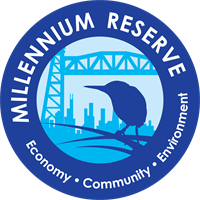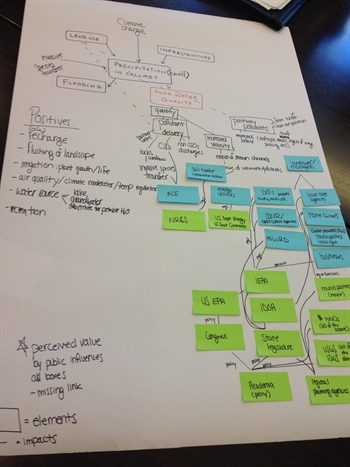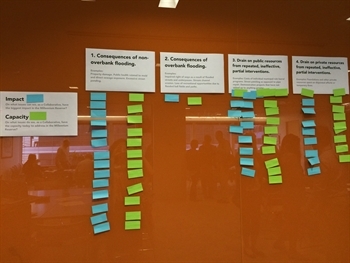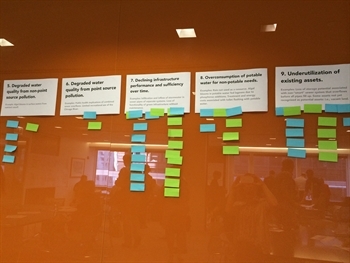
Photos by Lyndon Valicenti
Representatives from organizations such as MWRD, IEPA, US EPA and CNT participate in the Calumet Stormwater Collaborative to solve stormwater problems together.
In the Chicago region, addressing the negative impacts of stormwater—be they basement backups, swelling rivers, flooded streets or combined sewer overflows—is a difficult and daunting task for all involved, from the property owners whose homes and businesses are damaged, to the local governments responding to flood events, to wildlife and downstream residents harmed by polluted water. Especially in the face of the increasing intensity and frequency of heavy rainfalls in this region due to climate change, handling rain is becoming a bigger and bigger problem.
The good thing is that there’s a lot of great work happening in the region on stormwater right now, including more use of green infrastructure, continued implementation of the Tunnel and Reservoir Plan and more and more money being invested in stormwater solutions. The limiting factor, though, is that many of those efforts are not being coordinated with each other or with other local efforts to make the most of limited dollars and impact.
With so many small, one-off physical projects occurring throughout the region, it’s very difficult to understand everything that’s going on, let alone estimate their impact on improving the region’s stormwater situation. Those with the money to invest don’t know where their investments will have the most impact and those with stormwater problems in need of solutions don’t know all the resources available to them. The Metropolitan Planning Council’s (MPC) interest in supporting coordinated, data-driven and efficient progress on stormwater solutions throughout the region put us in an ideal position to help align those efforts, particularly in the Millennium Reserve and Calumet region on the South Side of Chicago and the surrounding suburbs.

The Millennium Reserve is a transformed 210-square mile region with thriving commerce, communities and wildlife encompassing the Illinois Calumet region and southeast Chicago lakefront. It focuses on environmental and economic renewal for the region that weaves nature into the fabric of vibrant communities. Last year, a steering committee of business, local community and environmental leaders met to decide how best to showcase and improve upon the hidden gems and opportunities of the region, identifying 14 priorities on which to focus the region’s efforts.
MPC is facilitating one of those priorities, the Calumet Stormwater Collaborative, a wide-ranging collaboration of the key stakeholders that control land, infrastructure, financing tools or regulatory powers related to stormwater in the Calumet region. The Collaborative allows groups such as the Metropolitan Water Reclamation District, the City of Chicago, the South Suburban Mayors and Managers Association, Illinois and U.S. Environmental Protection Agencies, Chicago Wilderness and many others to coordinate the region’s efforts so that together they make a bigger impact than each individual effort combined.

Stormwater is a complex issue involving many actors; the Collaborative is working to make it easier to address.
In its first six months, the Collaborative is off to a strong start, bringing a fresh perspective to stormwater solutions. Rather than assuming the experts already know all the problems and solutions, the Collaborative took a step back, first by incorporating all the possible parties—including those working in areas not typically considered stormwater—such as economic development, workforce development, foundations and land banks. The Collaborative is fostering awareness of the many ongoing stormwater management initiatives in the Calumet region, forging a shared understanding of terms and establishing common goals. By exploring the stormwater problem in the Calumet region, the group uncovered differing perspectives on the positive and negative impacts of various types of precipitation; those perspectives led them to look at multi-faceted solutions.

Collaborative members made priorities based on the group's impact and capacity to make change.
A critical effort of the Collaborative was to distill that information into the fundamental challenges to more effectively managing stormwater in the Calumet region. Out of nine fundamental challenges, the Collaborative prioritized three based on the group’s potential impact and current capacity to address each challenge, as well as whether progress wouldn’t happen “but for” the Collaborative. The three priority challenges are:
- Consequences of non-overbank flooding;
- Drain on public and private resources from repeated, ineffective, partial interventions; and
- Declining infrastructure (grey and green) performance and sufficiency over time.

The Collaborative identified three (out of nine) fundamental stormwater challenges to guide their work.
With so many stormwater challenges to address and so many disparate efforts to address them, narrowing the scope of the issues the Collaborative is tackling is important to maximizing the group’s impact. From those three fundamental challenges, the group identified what the optimal scenarios would look like, began identifying how to measure success and established work groups, which are just beginning their work (see end of the article for a list).
Even in its infancy, the Collaborative is already making an impact on relevant issues in the region and fostering partnerships that would not otherwise have formed. Recently, informed by their list of priorities, the Collaborative advised Cook County on how to use the planning portion of the County’s Community Development Block Grant Disaster Recovery funds. The Collaborative is also in the process of advising the Illinois Environmental Protection Agency as they revise the funding priorities for their Illinois Green Infrastructure Grant program.
As evidence of the value that participants credit to the Collaborative, many member organizations are realigning their projects with the Collaborative’s priorities, adding new people they’ve met through the group to their project teams or offering up their research, funds and expertise to the Collaborative, all in addition to committing time to be involved. The Collaborative as a whole meets monthly, generally on the first Friday of the month (see below for info on the next meeting), in addition to work group meetings and communications happening continuously in the interim. Throughout the process, participants frequently comment on the benefits through the Collaborative of working with new people, being up to speed on what everyone else is doing, time saved interacting with partners regularly and the prospect of greater impact in having everyone working together toward the shared goal of addressing the region’s stormwater problems.
The next meeting of the Calumet Stormwater Collaborative will take place this Friday, Oct. 3 from 10:15am to 12:15pm at the offices of the South Suburban Mayors and Managers Association, 1904 W. 174th St., East Hazel Crest, Ill. To RSVP, contact Josh Ellis, jellis@metroplanning.org.
Calumet Stormwater Collaborative Action Items
Foundational knowledge building actions
- Stormwater efforts inventory Catalog existing stormwater work in the Calumet Area, including on-the-ground projects, planning, policy, and funding efforts in the region.
- Short-term information sharing and long-term research alignment Identify data and research needs, as well as necessary information for building common base of understanding stormwater management in the Calumet, in order to support greater strategic investment in leveraging full range of technologies in cost effective way. Assess whether other Collaborative members have some of this information available, or whether it must be secured via other means.
Capacity building and planning actions
- Fast-tracking Section 319 planning and approval Identify barriers and opportunities for developing EPA-approved Section 319 watershed plan(s) for the Calumet area, in order to enable area constituents to secure funding for projects that will improve water quality and flooding mitigation.
- Data sharing and modeling Build sewershed and water modeling capacity across Collaborative members, as well as information sharing systems and protocols.
- Streamlining municipal green infrastructure design Standardize and deploy shared design guidelines on green stormwater infrastructure solutions.
- Understanding green infrastructure installation, troubleshooting and maintenance Train volunteers and develop workforce in installations, troubleshooting and maintenance of green stormwater infrastructure in particular.
- Rain Ready and effective local planning strategies Pilot a planning and engagement model for incorporating both grassroots efforts and technical strategies into community-wide stormwater plans.
Opportunities for near-term Collaborative impact actions
- Lateral line diagnostics and property interventions at scale Build a collaborative effort for large-scale, smoke testing, downspout realignment and rain barrel deployment throughout Municipal Separate Storm Sewer System (MS4) communities.
- Land banking as a stormwater tool Jointly recommend policies and practices for the Cook County Land Bank and South Suburban Land Bank so as to deploy those land management tools for stormwater management and related green stormwater infrastructure initiatives.